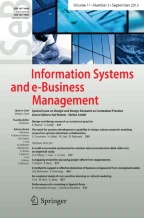Avoid common mistakes on your manuscript.
This special issue of Information Systems and e-Business Management (ISeB) relates to the challenges and opportunities of digital transformation. Digital transformation refers to a firm’s rethinking of how to use information technologies and other organizational resources to fundamentally change business performance and gain sustainable competitive advantages. A firm may be a digital predator or digital prey depending on the firm’s strategy of digital transformation, according to Forrester Research (2015). Firms that take advantage of digital transformation opportunities are likely to dominate in the competition, while those ineffectively dealing with the challenges are likely to be digital prey. Digital transformation is occurring in every industry and is touching every company in a unique way. Today almost all the business activities, including strategy development, marketing activities, sales, operations, customer relationship management, and supplier relationship management, are in the scope of digital transformation.
Six research articles are included in this special issue; they present a broad overview of digital transformation. The first paper develops an economic model to investigate the impact of digitalization on the profitability of the vendor that sells digital goods. The second paper examines the relationship between dissatisfied customers and repurchase behavior in online markets. The third paper examines determinants of intention to purchase virtual items in mobile application games. The fourth paper analyzes survey data to identify factors that affect customers’ intention to continually participate in online brand communities. The fifth paper discovers relationships between marketer-generated content (MGC), consumers’ engagement with MGC, word-of-mouth, and purchase intentions, by analyzing data collected from the Weibo platform. The last paper studies the effect of review tag functions on product evaluation and information perception of products with experimental methods and qualitative analysis.
We especially thank Professor Michael J. Shaw, who is extremely supportive of this special issue. We also thank all the reviewers for their constructive suggestions and comments. Finally, we are deeply grateful to all the authors of the articles for their hard work and cooperation.
Reference
Fenwick N (2015) Digital predator or digital prey? Forrester Research, March 3
Author information
Authors and Affiliations
Corresponding author
Additional information
Publisher's Note
Springer Nature remains neutral with regard to jurisdictional claims in published maps and institutional affiliations.
Rights and permissions
About this article
Cite this article
Cho, W., Fan, M., Yoo, B. et al. Special issue on digital transformation: challenges and opportunities. Inf Syst E-Bus Manage 19, 387–388 (2021). https://doi.org/10.1007/s10257-021-00535-2
Published:
Issue Date:
DOI: https://doi.org/10.1007/s10257-021-00535-2
